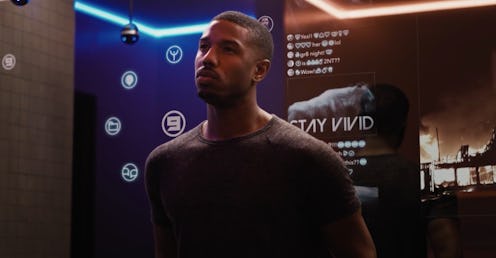Entertainment
How 'Fahrenheit 451' On HBO Eerily Puts Fake News In The Spotlight

In HBO’s new adaptation of Ray Bradbury’s classic novel Fahrenheit 451, technology plays an even bigger role than in the book to reflect a modernized version of society. This makes total sense, as technology has advanced much more than imagined during the time the book was written. Just look at how writer/director Ramin Bahrani introduces the Nine in Fahrenheit 451, a social media platform that provides all citizens with information. It replaces all forms of literature, including journalism, by only showing videos and pictures. Even the captions in their version of Instagram only contain a few words, with emojis taking over.
What makes the Nine so creepy is how realistic it actually feels. In the beginning of the film, streaming as of May 19, we see Montag getting his news from the Nine’s video stream, with vlogger Raven (YouTube star Lilly Singh) giving blatantly biased news praising the firemen’s work. Yuxie, Fahrenheit’s version of Amazon's Alexa, tells Montag that his “fans are waiting at the Nine” and Montag swipes through various pictures of him on the job, picking out one that shows him holding his intimidating-looking fire shooter. We also see him buy new boots with the touch of a button when a picture of them pops up onscreen.
It’s clear that social media determines people’s viewpoints in this imagined society, which unfortunately isn’t too far off from our own. Although Fahrenheit is set in a dystopian future, Bahrani wanted to show how close we are to being part of that world thanks to the control technology has over our lives. In an essay he wrote for New York Times, the director detailed why he felt it was important to focus on the negative aspects of technology. “Bradbury was worried about the advent of Reader’s Digest. Today we have Wikipedia and tweets. He worried that people would read only headlines. Today it seems that half the words online have been replaced with emojis. The more we erode language, the more we erode complex thought and the easier we are to control,” wrote Bahrani.
By releasing the film now, Bahrani is bringing attention to Bradbury’s initial warning, and showing us just how eerily similar the use of technology in the novel is to the role it plays in our lives already. With social media apps like Instagram, it’s very easy to feel like you have to be part of a certain lifestyle to fit in, with social media influencers becoming celebrities and getting certain perks for their popularity. Meanwhile, sites like Twitter and Facebook also have a lot of power on what type of news is spread. Under the Trump administration, we have seen the manipulation of facts and the disdain towards journalists sharing factual information. There is less importance given to facts, and more given to providing biased opinions that help those in power.
It's easy to see why Bahrani feels so strongly about calling attention to the role of media in current society with Fahrenheit. The Nine represents what happens if we let media — particularly social media — take over our lives. At the time of writing Fahrenheit 451, Bradbury was mostly concerned with television replacing literature. Now, the role that the story’s warning has on society is heightened. There are bigger threats, with a larger control of access to information. As Bahrani wrote in his New York Times piece, “Imagine how easy it could be to rewrite Benjamin Franklin’s Wiki entry to match what the firemen in Bradbury’s novel learn about the history of the fire department: ‘Established, 1790, to burn English-influenced books in the Colonies. First Fireman: Benjamin Franklin.’ In his way, Bradbury predicted the rise of ‘alternative facts’ and an era of ‘post-truth.’”